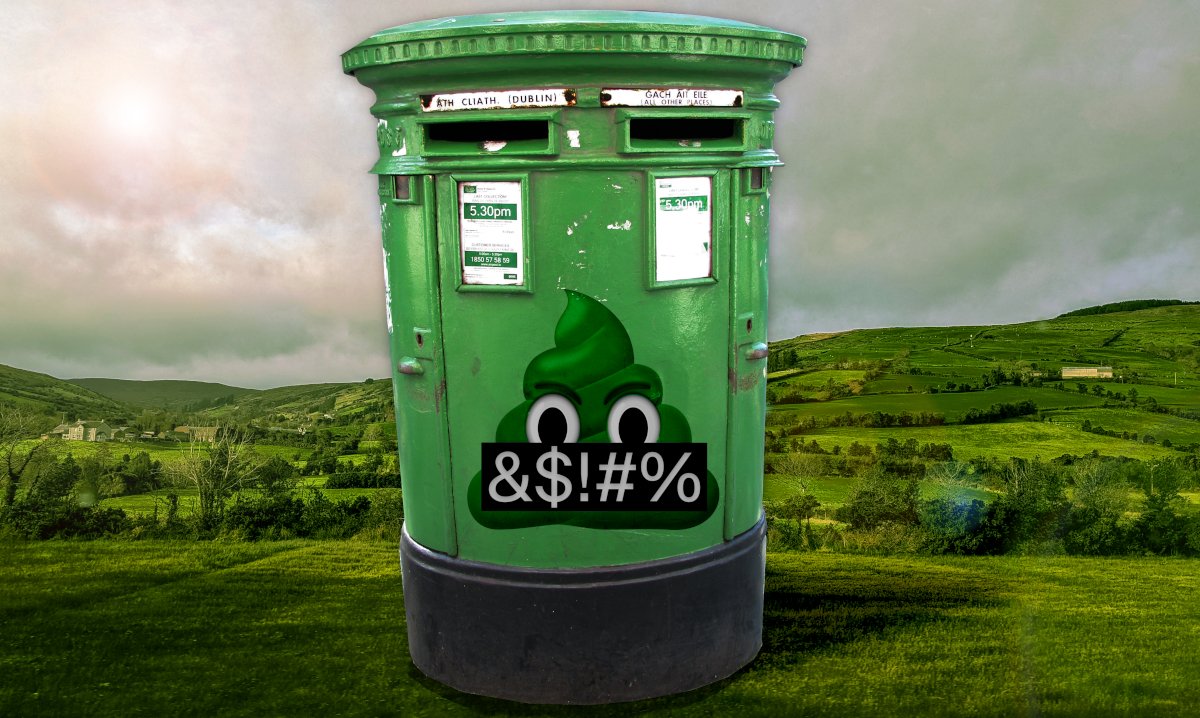@fakedansavage I think it says that you guys are normal inasmuch as you're falling victim to the "peak indifference" trap - where it's easy to ignore the problems with something that works well but fails badly, until those failures mount to a point where you can't ignore them anymore.
@fakedansavage It's emblematic of a LOT of different kinds of problems we have. I hear you talk to people on your show all the time who suffer from this: "The good parts are good, the bad parts are really bad, and they're not getting better, but i can just ignore them, right?"
@fakedansavage And generally you tell them, no, this isn't gonna get better (thinking generically of the people in relatively new relationships where the sex isn't very good, whom you generally advise to break things off rather than get married, move in, make a baby, etc).
@fakedansavage In the wider world, there are a lot of artificial instances of "peak indifference," where an industry uses some of the profits from its works well/fails badly products to sow doubt and obscure the harms.
@fakedansavage Things like cancer/tobacco (whose corporate strategy memo literally contained the phrase, "Our product is doubt"), or fossil fuels/global warming (AKA #ExxonKnew).
I'd argue that commercial surveillance (including the Alexa) fits into that deliberate doubt-sowing category.
I'd argue that commercial surveillance (including the Alexa) fits into that deliberate doubt-sowing category.
@fakedansavage The commercial surveillance industry is incredibly Byzantine ("some things are hard to understand because they're complicated; some things are complicated so they'll be hard to understand"), and it delivers immediate tangible benefits and long-term, ghastly harms.
@fakedansavage as with (say) smoking/cancer, there's no one privacy choice you can point to and say, "There, that's the step too far, now you are doomed." Instead, puff after puff, data-point after data-point, the risk mounts until it tips - a horrible privacy rupture, a shadow on the X-ray.
@fakedansavage Same goes for climate - there isn't a way to connect the CO2 plume from a specific smokestack to the hurricane-wrecked remains of a low-lying island. If each puff created a tumor, if each CO2 emission gave rise to a wildfire, we'd have given both up long ago.
@fakedansavage In the short term, smoking gives the smoker pleasure, not cancer. Gasoline gives you mobility, not wildfires. Privacy invasions give you subsidized media and convenience, not identity theft, profiling, and a bounty for stalkers, swatters and nosy future bosses/landlords.
@fakedansavage What's more, the problem isn't primarily one of individual choices: you, personally, can't replace your gas car with an efficient, well-maintained, reasonably priced subway network.
@fakedansavage You (probably) can't predict all the ways that your Alexa is spying on you, either, and you can't singlehandedly mitigate them, either. Yes, you can choose a bike or an EV, or not get an Alexa (I do these things), but they won't solve the problem on their own.
@fakedansavage After all, privacy is a team sport. I don't use Gmail (my mail is on a standalone server that @orenwolf keeps at a data-center in Toronto, and I POP it every 60 seconds and move the mail offline to my encrypted laptop).
@fakedansavage @orenwolf In some sense, none of my mail is in the cloud. In another sense, ALL of my mail is in the cloud, because EVERYONE I SEND MAIL TO is using Gmail or a handful of its competitors, all of whom mine that email for commercial surveillance purposes.
@fakedansavage @orenwolf My individual choices only go so far. We need SYSTEMIC (not individual) answers to privacy-invading commercial practices (as well as fossil fuels, etc).
To start, abolish "capitalist realism," the idea that all this is inevitable ("There is no alternative" - M. Thatcher).
To start, abolish "capitalist realism," the idea that all this is inevitable ("There is no alternative" - M. Thatcher).
@fakedansavage @orenwolf There is nothing inevitable about a smart speaker or an email service that spies on you. No one came down off a mountain with two stone tablets reading, "Larry, Sergey, thou shalt stop rotating thine logfiles and instead mine them for actionable market intelligence."
@fakedansavage @orenwolf Likewise, there's nothing inevitable about ad-supported services requiring surveillance. 99.99999% of advertising's history has been surveillance-free, targeted to context, rather than individuals:
https://twitter.com/doctorow/status/1291056371702460422
@fakedansavage @orenwolf Dan's Alexa doesn't need to spy on him - it does so because the costs of spying (commercial exploitation, privacy breaches, authoritarian search-warrants) are externalized onto us, while the gains are privatized by Amazon.
@fakedansavage @orenwolf The false dichotomy of "privacy" with "subsidy" or "convenience" is a deliberate conjob, the commercial surveillance industry's version of the fossil fuel propaganda that insists that we either destroy our planet or freeze to death in the dark.
@fakedansavage @orenwolf The reason I call this whole dynamic "peak indifference" is that there's a moment when the intrinsic, unavoidable harms of the thing that works well but fails badly are so manifest that they can no longer be denied. A moment when no one needs to tell you there's a problem here.
@fakedansavage @orenwolf I think we've crossed that threshold for climate and tobacco, and maybe even privacy. Even if climate activists never said another word, the number of people alarmed about the climate emergency will only go up from here on in.
@fakedansavage @orenwolf How can it not? If "a conservative is a liberal who's been mugged," then "a climate activist is a denier who's lost their home or loved ones or EVERYTHING to famine, wildfires, flooding, hurricanes or tornadoes."
@fakedansavage @orenwolf But that alarm alone won't mean we'll finally address the climate emergency. Indeed, if the narrative then is that we've crossed the point of no-return, then denialism can easily slide into nihilism.
@fakedansavage @orenwolf As in, "Yeah, yeah, you were right all along, rhinos ARE endangered. But now that there's only one rhino left in all the world, why don't we find out what he tastes like?"
@fakedansavage @orenwolf Nihilism is the only sin here, because nihilism GUARANTEES that the problem will only ever get worse.
So, to answer your question, Dan - what your continued use of your Alexa means depends on why you came to that decision.
So, to answer your question, Dan - what your continued use of your Alexa means depends on why you came to that decision.
@fakedansavage @orenwolf If you arrived at it because you still haven't reached the point where the harms are more manifest and obvious than the gains, it says that you're guilty of the same "hyperbolic discounting" (undervaluing future harms and overvaluing present gains) that your callers engage in.
@fakedansavage @orenwolf But! If you took that decision because you're surrendering to commercial surveillance EVEN THOUGH you believe that it is as harmful as I think it is, then it says that you've lost hope - and that you need to find and nurture it again, so that you can be part of the solution.
@fakedansavage @orenwolf You can (and should) demand a surveillance-free smart-speaker. Even more, you should demand that smart-speakers be surveillance-free as a matter of law - the same way we should all be demanding that our transport be emissions-free.
@fakedansavage @orenwolf The surveillance in your Alexa was a choice, not an inevitability. It didn't have to be that way. You can have convenience AND privacy. We can have lights and heat and the internet AND a habitable planet.
https://twitter.com/doctorow/status/1469053166968737796
@fakedansavage @orenwolf There's a world of difference between using your public profile to spread rage at the idiotic, harmful choices of tech monopolies, and using that profile to spread nihilistic surrender. I think you want to do the former!
@fakedansavage @orenwolf And I get that replacing your Alexa might not be the best way to use your time to make the world a better place.
@fakedansavage @orenwolf As @ZephyrTeachout tells us in BREAK 'EM UP, it's better to use Amazon to by supplies for strike signs than it is to waste hours driving around looking for mom-and-pop stationery stores - hours that you could be spending picketing the Amazon warehouse.
pluralistic.net/2020/07/29/bre…
pluralistic.net/2020/07/29/bre…
@fakedansavage @orenwolf @ZephyrTeachout What you do matters more than what you buy. Consumerism - the pathetic delusion that your are a mere ambulatory wallet - is far weaker than solidarity and citizenship.
@fakedansavage @orenwolf @ZephyrTeachout America trails the world in privacy regulation, and is sorely in need of a federal privacy law with a private right of action.
eff.org/deeplinks/2019…
eff.org/deeplinks/2019…
@fakedansavage @orenwolf @ZephyrTeachout This has a lot of crossover with your wheelhouse - smart sex toys shouldn't also be data-leaking sex-toys, in the same way that sex toys shouldn't be made out of materials that leach carcinogens into your mucus membranes.
@fakedansavage @orenwolf @ZephyrTeachout It's okay to want a smart speaker but hate the spying in the same way it's okay to want a dildo but not want to get cancer from it. And in both cases, it shouldn't be up to you to "buy wisely" - spying smart speakers should be illegal the way that carcinogenic dildos should be.
@fakedansavage @orenwolf @ZephyrTeachout So I absolve you, as a "consumer" from getting rid of your Alexa. But I charge you, as a CITIZEN, to support strong privacy regulation and other regs (like antimonopoly enforcement that will make it harder for Big Tech to fight privacy law).
@fakedansavage @orenwolf @ZephyrTeachout Only you can decide what your priorities should be - but we all have to support one another to stave off nihilism, because we're all in this together.
• • •
Missing some Tweet in this thread? You can try to
force a refresh










